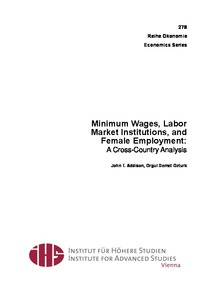Minimum wages, labor market institutions, and female employment: a cross-country analysis

Institute for Advanced Studies, Vienna ; Addison, John T. ; Ozturk, Orgul Demet
IHS - Vienna
2011
53 p.
employment security ; minimum wage ; regulation ; statistics ; women workers ; labour market policy
Economics Serie
278
Wages and wage payment systems
English
Bibliogr.
"The authors investigate the employment consequences of minimum wage regulation in 16 OECD countries, 1970-2008. Their treatment is motivated by Neumark and Wascher's (2004) seminal cross-country study. Apart from the longer time interval examined, a major departure is the authors' focus on prime-age females, a group often neglected in the minimum wage literature. Another is their deployment of time-varying policy and institutional regressors. The average effects they report are consistent with minimum wages causing material employment losses among the target group. Their secondary finding is that minimum wage increases are more associated with (reduced) participation rates than with elevated joblessness. Further, although the authors find common ground with Neumark and Wascher as regards the role of some individual labor market institutions and policies, they do not observe the same patterns in the institutional data. Specifically, prime-age females do not exhibit stronger employment losses in countries with the least regulated markets."
Digital
The ETUI is co-funded by the European Union. Views and opinions expressed are however those of the author(s) only and do not necessarily reflect those of the European Union or the ETUI.